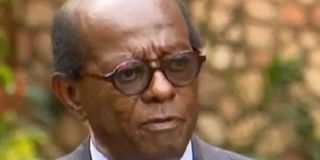Government must keep off Mailo land

Peter Mulira
What you need to know:
- Suspicion. Many people suspect that the recommendation is intended to implement the policy statement set out in paragraph 44 of the National Land Policy document, which provides that ‘The government shall resolve and disentangle the multiple, overlapping and conflicting interest and rights on Mailo land.”
In its interim report to President Museveni, the Commission of Inquiry into land matters is reported to have recommended the abolition of Mailo land titles in order to reduce land tenures from four to three.
Although the commission has been taking evidence from the public for more than six months, and to its credit, has unearthed a lot of bad things in the management of land matters, not a single witness has accused Mailo to be the cause of the rampant frauds at the land office and the senseless land grabbing taking place in the country.
As a result, many people suspect that the recommendation is intended to implement the policy statement set out in paragraph 44 of the National Land Policy document, which provides that ‘The government shall resolve and disentangle the multiple, overlapping and conflicting interest and rights on Mailo land.”
These rights were, however, settled for good under the Busuulu and Envujjo Law of 1927, and the only issue which remained was how to replace rent receipts with title deeds as evidence of ownership of a domestic kibanja.
In recommending abolition of Mailo title, the commission made the mistake of regarding Mailo land as separate from freehold tenure, which is the only land tenure in Uganda from which all interests, including Mailo, emanate.
The Land Regulations of 1897 vested all land in the Commissioner (Governor) and later the Crown Lands (Declaration) Ordinance of 1922 provided that all lands and any rights therein in the protectorate was presumed to be the property of the British Crown.
In effect, therefore, all land in the protectorate was freehold. However, the Buganda Agreement of 1900 modified the full force of freehold tenure when it provided that ‘Europeans and non-natives who have acquired (freehold) estates, and whose claims thereto have been admitted by the Uganda Administration will receive title deeds for such estates in such manner and with such limitations as may be formulated by Her Majesty’s representative.’
To implement the above provision, the Crown Lands Ordinance of 1903 was enacted and governed acquisition of interests on Crown land (9000 square miles), while the Land Law of 1908 governed acquisition of interests on land reserved for Africans (8000square miles).
Under the latter law, Mailo could only be acquired by non-Africans with the consent of the Commissioner (Governor) and the lukiiko (parliament). The law also defined for the first time what Mailo interest meant.
Following complaints by African leaders in 1916, the colonial secretary directed that all estates acquired by Europeans on Mailo land should be converted to 99 year grants so as to abide by the spirit of the 1900 Buganda Agreement. This was followed by the introduction of three registers at the land office namely Mailo, freehold and leasehold registers, whose entries cannot be interchanged.
This means that once an interest is registered in the Mailo register, it cannot be transferred to the freehold register and vice versa.
However, the land office has been fraudulently issuing freehold titles to powerful people over Mailo land, which titles are not registered anywhere with the result that there are two title deeds over the same piece of land - one Mailo and the other freehold. The effect of implementing the recommendation to abolish Mailo titles will be to cheat Mailo owners of their interest as well as legally sanctify what is reprehensible.
The recommendation overlooked two important impediments: First, under the Torrens system of land registration we borrowed from Australia a title deed, is sacrosanct and can only be cancelled for fraud. Not even Parliament has the constitutional wherewithal to amend this protection. Our attention should be directed elsewhere.
Mr Mulira is a lawyer.
[email protected]




